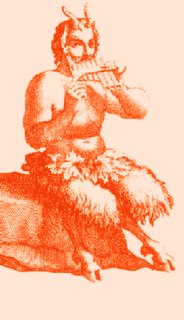Nonas December

Modern Date : December 5th
Nonas December
The Nones of December
This is one of the dies comitiales when committees of citizens could vote on political or criminal matters. The rex sacrorum would appear on the steps of the Capitol on this day and announce to the people what days of the months would be holidays.
Faunalia
This day is sacred to Faunus and was also known as the Faunalia. This festival was more popularly celebrated in rustic areas, being a celebration of nature and animals. The people celebrated this festival with a dance done in triple measure, the same dance done by the priests of Salii, the priests of Mars. Faunus was the grandson of Cronus (Saturn). He was worshipped as the god of fields and sheperds, and as a prophetic god.
On this day in 63 BCE Cicero pre-empted tha catiline conspiracy and arrested all its members. They had planned to start fires in Rome, murder the senators, and take control.
Decima, the middle Fate in charge of the present, presides over December, but the month may have received its name as the tenth month of the Roman calendar. Vesta, patroness of fire also laid claim to the month of December.
Eve of St Nicholas
In the Netherlands, children put their wooden shoes (or sometimes baskets) by the mantel on the eve of St. Nicholas and expect to find them filled with treats the next morning. St Nicholas rides through the air on his white horse and comes down the chimney to fill them. Carrots and hay are left out for his white horse.
Czechoslovakian kids believe he comes down a golden cord carrying a basket of apples, nuts and candies. In Hungary, the shoes are left outside the window. In France, children hang stockings near the fire and say this prayer:
Saint Nicholas, mon bon patron,
Envoyez-moi quelque chose de bon.
In the Netherlands, children sing special songs welcoming St Nicholas after spreading a large white sheet on the floor. The door suddenly opens and a shower of goodies falls upon the sheet. Then St Nicholas appears, dressed in his ecclesiastical robes, and questions the children about their behavior. He is accompanied by Zwarte Piet, or Black Peter the Moor, who carries a thick rod and a sack and threatens to carry the children off if they are bad. After the children are sent to bed, adults exchange gifts and feast on hot punch, chocolate and boiled chestnuts served hot with butter and sugar.

0 Comments:
Post a Comment
<< Home